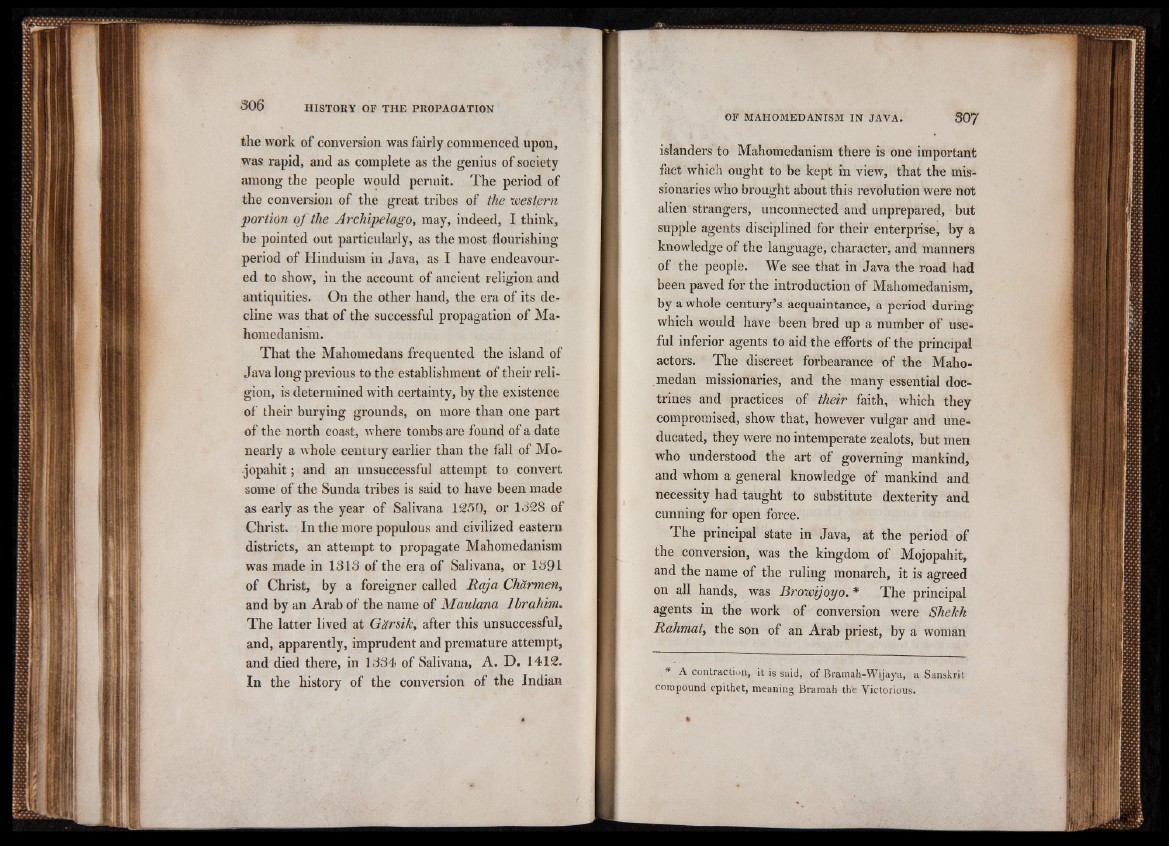
the work of conversion was fairly commenced upon,
was rapid, and as complete as the genius of society
among the people would permit. The period of
the conversion of the great tribes of the western
portion of the Archipelago, may, indeed, I think,
be pointed out particularly, as the most flourishing
period of Hinduism in Java, as I have endeavoured
to show, in the account of ancient religion and
antiquities. On the other hand, the era of its decline
was that of the successful propagation of Ma-
homedanism.
That the Mahomedans frequented the island of
Java long previous to the establishment of their religion,
is determined with certainty, by the existence
of their burying grounds, on more than one part
of the north coast, where tombs are found of a date
nearly a whole century earlier than the fall of Mo-
jopahit; and an unsuccessful attempt to convert
some of the Sunda tribes is said to have been made
as early as the year of Salivana 1250, or 1328 of
Christ. In the more populous and civilized eastern
districts, an attempt to propagate Mahomedanism
was made in 1313 of the era of Salivana, or 1391
of Christ, by a foreigner called Raja Charmen,
and by an Arab of the name of Maulana Ibrahim.
The latter lived at Garsik, after this unsuccessful,
and, apparently, imprudent and premature attempt,
and died there, in 1334 of Salivana, A. D. 1412.
In the history of the conversion of the Indian
islanders to Mahomedanism there is one important
fact which ought to be kept in view, that the missionaries
who brought about this revolution were not
alien strangers, unconnected and unprepared, but
supple agents disciplined for their enterprise, by a
knowledge of the language, character, and manners
of the people. We see that in Java the road had
been paved for the introduction of Mahomedanism,
by a whole century’s, acquaintance, a period during
which would have been bred up a number of useful
inferior agents to aid the efforts of the principal
actors. The discreet forbearance of the Maho-
medan missionaries, and the many essential doctrines
and practices of their faith, which they
compromised, show that, however vulgar and uneducated,
they were no intemperate zealots, but men
who understood the art of governing mankind,
and whom a general knowledge of mankind and
necessity had taught to substitute dexterity and
cunning for open force.
The principal state in Java, at the period of
the conversion, was the kingdom of Mojopahit,
and the name of the ruling monarch, it is agreed
on all hands, was Browijoyo. * The principal
agents in the work of conversion were SheJck
Rahmat, the son of an Arab priest, by a woman
* A contraction, it is said, of Bramah-Wijaya, a Sanskrit
compound epithet, meaning Bramah th'fe Victorious.